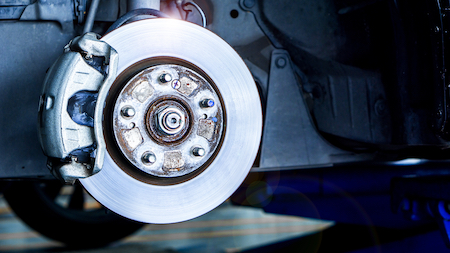Do you remember the first time you slid behind the wheel of your current vehicle? It had a particular sound; it performed in a certain way.
As the weeks and months roll by, you may start noticing things changing. There’s a new noise. Or you have to press down on the brake pedal more for the same performance level.
These are warning signs designed to keep you safe. If you pay attention to these changes, you can bring your car in for an inspection and locate minor issues that are easy to repair. It prevents the problems from escalating into major repairs.
How today’s modern car brake systems work
Modern car brake systems use a combination of friction, vacuum assistance, and electronic control to slow and stop a vehicle. The most common brake system in cars today is the disc brake system.
The disc brake system consists of a rotor attached to the wheel hub, and a caliper, which houses the brake pads. When the driver presses the brake pedal, brake fluid is sent under pressure through the brake lines to the caliper. The caliper then uses pistons to press the brake pads against the rotor, creating friction and slowing the wheel.
Disc brakes are more efficient than drum brakes, commonly used in older cars. Disc brakes can dissipate heat better, which allows them to maintain their braking power even in heavy use. Additionally, disc brakes are less likely to suffer from brake fade, which is the loss of braking control due to overheating.
In addition to the friction created by the brake pads, many modern cars also feature a vacuum assist mechanism. This mechanism uses the vacuum created by the engine to provide additional force on the brake pedal, making it easier for the driver to brake.
They can also feature electronic control systems that help optimize braking performance.
Anti-lock braking systems (ABS) use sensors to detect when a wheel is about to lock up, and modulate the brake pressure to prevent the wheel from locking.
Or they use Electronic Stability Control (ESC), which helps to improve a vehicle’s stability by detecting and reducing loss of traction. The system applies the brakes to individual wheels and can reduce engine power when the driver loses control of the vehicle.
The most common brake noises
Car brakes are an essential safety feature of any vehicle, and it is important to pay attention to any unusual noises or sensations when braking. Below are some common brake noises and what they may indicate, as well as potential solutions for each problem.
Squealing or screeching
If your brakes make a high-pitched squealing or screeching noise, it is likely that the brake pads are worn and need to be replaced. A small metal tab causes this noise, called a wear indicator, that rubs against the rotor when the pads are worn down. It is crucial to address this issue as soon as possible, as worn brake pads can reduce braking effectiveness and increase stopping distance.
Grinding
A grinding noise when braking signifies that the brake pads are worn down to the metal. The metal of the rotor is pressing into the metal of the caliper, causing damage to both components. This is a serious issue that should be addressed immediately, as driving on worn-out pads can cause expensive damage to the rotors and calipers and significantly decrease braking performance.
Clicking
A clicking noise when braking can be caused by several issues, such as worn-out brake pads, a loose brake caliper, or a problem with the brake pad guides. In most cases, this noise can be resolved by replacing worn brake pads or tightening loose components. However, if the clicking persists, it is best to have the vehicle inspected by a professional mechanic to determine the cause.
Rumbling
A rumbling noise when braking can be caused by warped rotors. This can happen if the rotors get too hot due to excessive braking or hard driving, causing the metal to warp and lose its smooth surface. Warped rotors can be resurfaced or replaced to fix the issue.
Sinking Pedal
If the brake pedal sinks to the floor when pressed, it may indicate a problem with the brake system’s vacuum booster or a leak in the brake lines. This issue can be dangerous, leading to a loss of braking power. It is important to have the vehicle inspected by a professional mechanic as soon as possible to determine the cause and find a solution.
In general, it is recommended to have your brakes regularly inspected by a professional mechanic to ensure that they are in good working condition. This will help to identify any issues before they become more serious and expensive to repair. Additionally, always pay attention to any unusual noises or sensations when braking, and have the vehicle inspected if you notice anything out of the ordinary.
Are your brakes making a funny noise?
It’s a sign you might have a problem that could put you and your passengers at risk.
Brake noises can indicate a variety of problems, from worn brake pads to more serious issues, such as warped rotors. It is essential to pay attention to any unusual noises or sensations when braking, and to have the vehicle inspected by a professional mechanic to determine the cause and find a solution. Regular brake inspections can also help identify any issues before they become more serious and expensive to repair.

